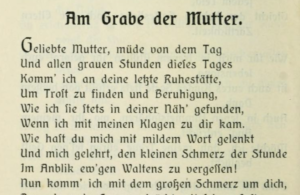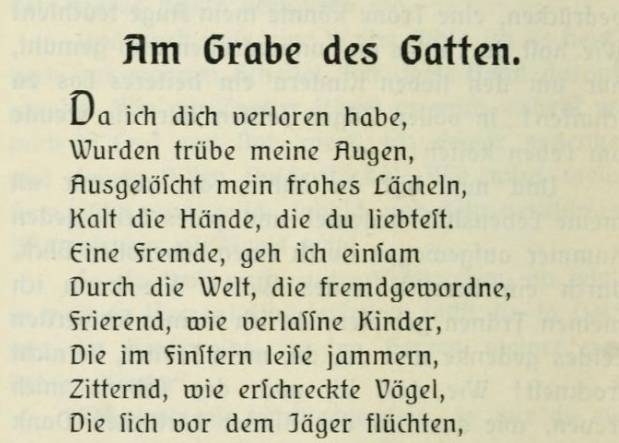| Source (German) | Translation (English) |
|---|---|
Am Grabe der Mutter. |
At the Grave of one’s mother. |
Geliebte Mutter, müde von dem Tag Und allen grauen Stunden dieses Tages Komm!’ ich an deine letzte Ruhestätte, Um Trost zu finden und Beruhigung, Wie ich sie stets in deiner Näh’ gefunden, Wenn ich mit meinen Klagen zu dir kam. |
Beloved mother, weary of this day And all of its dim hours I come to your final resting place, To find comfort and reassurance, As I have always found near you, When I came to you with my complaints. |
Wie hast du mich mit mildem Wort gelenkt Und mich gelehrt, den kleinen Schmerz der Stunde Im Anblik ew’gen Waltens zu vergessen! |
How you guided me with a gentle word And taught me the lesson of minor pain — To be forgotten in view of Eternity’s reign! |
Nun komm’ ich mit dem großen Schmerz um dich, Der mir mein Herz zerdrückt mit seiner Last, Und meine fast, ich höre deine Stimme, Die mich mit altgewohntem güt’gen Klange Zu jenen Himmelshöhen wieder weist, Wo du vereint mit edlen sel’gen Geistern Das letzte Ziel erreicht, das du ersehnt. |
Now I come to you with immense grief, That crushes my heart with its burden, And to me, almost, I can hear your voice, Which, with its familiar kind old sound, Points once more to those heavenly heights, Where you are united with precious, blessed spirits Having reached the last goal you longed for. |
Und ob es mir auch schwer wird, mich zu fassen, Und ob mich selbst in kurzer Schlummerstunde Der Schmerz befällt, so wie ein reißend’ Tier Dem Unbewehrten naht, ihn zu zerfleischen, So will ich doch gedenkend deiner Lehren Versuchen so zu leben, wie du es Von deinem Kinde gern gesehen hättest; Denn über alles ging dein Gottvertrau’n. |
And even if it’s hard for me to hold myself together When even after a short nap This pain [still] attacks me — like a ravenous predator Approaches the unarmed to tear them to pieces, — I will recall your teachings To try to live as you would have As you would have liked to see from your child; For above all else went your trust in God. |
Ich spreche denn: der Ew’ge hat gegeben Und hat genommen. Er sei hochgelobt! |
I say then: the Eternal has given And has taken away. Praise be to them! (Job 1:21 part) |
Dir aber, Teure, werde jener Friede, Der mir noch ferne ist und den ich mir Als höchste Gunst von Gott, dem Herrn, erflehe, Der auch der Waise mitleidsvoll gedenkt Und der sein Kind um deinetwillen nicht Verstoßen wird von seinem Angesichte. |
But to you, beloved, may you have that peace, Which is still far from me, and which I myself Implore, as the highest favor of the Lord, God, Who also remembers the orphan with compassion And who, for your sake, will not Cast his child away from his presence. |
“Am Grabe der Mutter” by Lisa Tarlau can be found in Rabbi Max Grunwald’s anthology of Jewish women’s prayer, Beruria: Gebet- und Andachtsbuch für jüdische Frauen und Mädchen (1907), pages 540-541.
The transcription of the German provided machine-readable text for machine translations by DeepL, which we then edited for accuracy and clarity. We welcome any/all corrections, improvements, and additional transcriptions and translations of this work’s contents. –Aharon Varady
Source(s)


“Am Grabe der Mutter | At the grave of one’s mother, a teḥinah by Lise Tarlau (1907)” is shared through the Open Siddur Project with a Creative Commons Attribution-ShareAlike 4.0 International copyleft license.










Leave a Reply